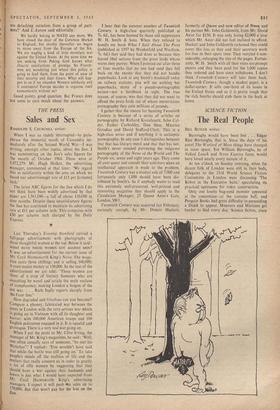THE PRESS
Sales and Sex
RANDOLPH S. CHURCHILL writes: When I was so rudely interrupted—to para- Phrase the immortal words of Cassandra im- mediately after the Second World War—I was Writing, amongst other topics, about the Sun. I Was cornmenting on the Sun's sales figures for the month of October 1964. These were at 1,472,279. Mr. Hugh Holker, the advertising manager, commented at that time : 'We regard this as satisfactory within the area on which we based our advertisement rate of £11 per [column] inch.' •
The latest ABC figures for the Sun which I do not think have been widely advertised by that Paper are 1,361,090—a fall' of above 110,000 in nine months. Despite these unsatisfactory figures the Sun has continued to maintain its advertising rate at £11 per column inch. This compares with £30 per column inch charged by the Daily Express.
ylr Last Thursday's Evening Standard carried a full-page advertisement with photographs of three thoughtful women at the top. Below it said
WHAT HAVE THESE WOMEN GOT AGAINST MEN? It was an–advertisement for the current issue of Mr. Cecil Harmsworth King's Nova. The maga- zine costs three shillings and is selling .160,000; it even makes money at 150,000. In the text of the advertisement we are told: 'These women are three of a crop of literary lionesses who are assaulting by novel and article the male enclave of complacency, making London a Saigon of the sex war. . . . Ruth Inglis reports sharply from tile front line.'
How degraded and frivolous can you become? Compare a phoney, fabricated war between the sexes in London with the very.serious war which is going on in Vietnam with all its slaughter and horror; with 100,000 American troops and 100 English policemen engaged in it. It is squalid and grotesque. There is a very real war going on,
When I put the point to Mr. Clive Irving, the manager of Mr. King's magazines, he said: 'Well, one often casually says of someone, "he met his Waterloo".' I replied: 'You wouldn't have said that while the battle was still going on.' To take People's minds off the realities of life and the matters that really concern us in order to gratify a lot of silly women by suggesting that they should have a war against their husbands and lovers is just what I would have expected from Mr. Cecil Harmsworth King's advertising Managers. I expect it will push She sales up to 170,000. But that won't pay for the loss on the Sun.
I hear that the summer number of Twentieth Century, a high-class quarterly published at 7s. 6d., has been banned by those old suppressors W. H. Smith & Sons. When they refused to handle my book What I Said About The Press (published in 1957 by Weidenfeld and Nicolson, 7s. 6d.) they said they had done so because they feared libel actions from the press lords whose wares they purvey. When I pointed out after three or four months that no one had sued they fell back on the excuse that they did not handle paperbacks. Look at any Smith's bookstall today on railway stations; you will see nothing but paperbacks, many of a pseudo-pornographic nature—not a hardback in sight. The true reason, of course, was that they did not want to offend the press lords out of whose meretricious pornography they coin millions of pounds.
I gather that the reason for banning Twentieth Century is because of a series of articles on pornography by Richard Kostelanetz, John Cal- der, Father Corbishley, Dan Snee, Maurice Girodias and David Stafford-Clark. This is a high-class series and if anything it is antiseptic pornography. In any case it distinguishes between that that has literary merit and that that has not. Smith's never minded purveying the vulgarest pornography of the News of the World and The People six, seven and eight years ago. They come all over queer and consult their solicitors when an intellectual approach is made to the problem. Twentieth Century has a modest sale of 7,000 and fortunately only 1,000 should have been dis- tributed by Smith's. So if anybody wants to read this extremely well-presented, well-printed and interesting magazine they should apply to the Circulation Manager, 25 Queen Anne's Gate, London, SW1.
Twentieth Century was acquired last February, curiously enough, by Mr. Dennis Hackett, formerly of. Queen and now editor of Nova, and his partner Mr. John Goldsmith, from Mr. David Astor for £150. It was only losing £2,000 a year which Mr. Astor did not feel inclined to afford. Hackett and John Goldsmith reckoned they could cover this loss as they and their secretary work for free in their spare time. They restyled it con- siderably, enlarging the size of the pages. Fortun- ately, W. H. Smith with all their vices are prompt payers and they have paid for the 1,000 copies they ordered and have since withdrawn. I don't think Twentieth Century will take them back. Twentieth Century, though a modest paper, is a dollar-earner. It sells one-third of its issues in the United States and so it is pretty tough that the rich Smiths should stab them in the back at home.






























 Previous page
Previous page